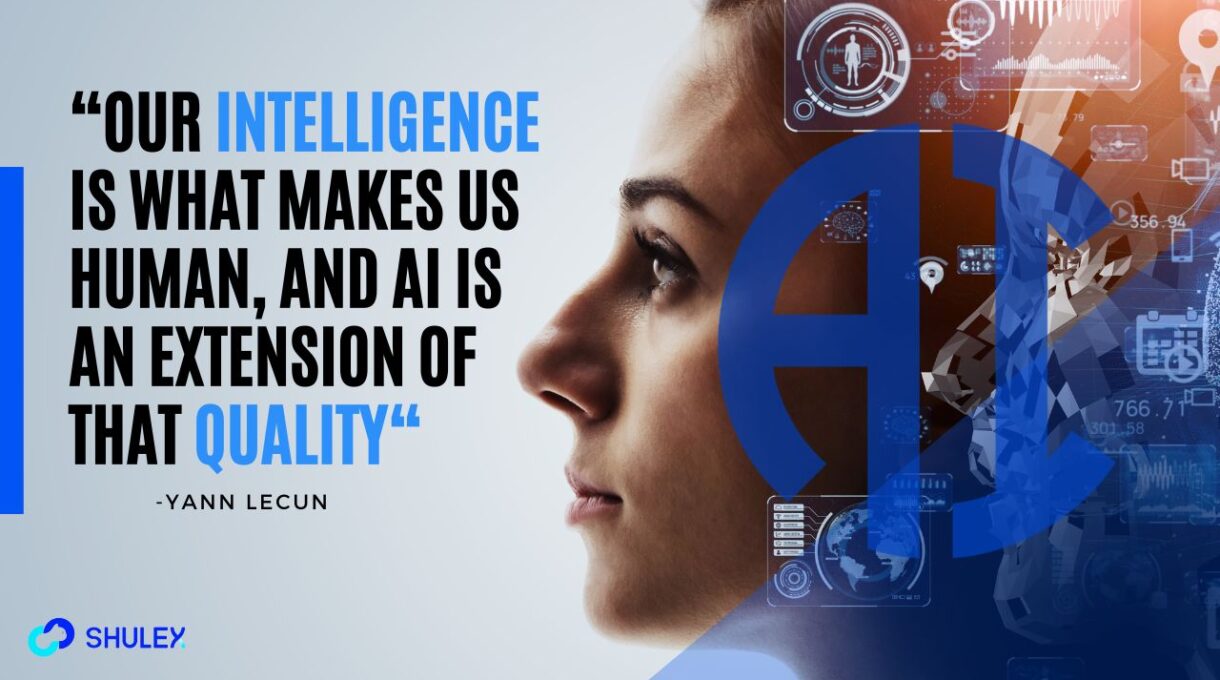Consumers are using WhatsApp, Facebook Messenger, Instagram, and nearly every other social media platform to ask questions about goods and services. Do you intend to respond to them? It can be challenging for most businesses to keep an eye on social media activity around-the-clock. Conversational AI can assist with that!
Keep reading and learn how using a conversational AI tool for social customer service and social commerce can help your business!

“Our intelligence is what makes us human, and AI is an extension of that quality” reflects the idea that human intelligence is a fundamental characteristic that sets us apart from other species, and artificial intelligence (AI) is a tool created by humans to extend and augment our cognitive abilities.
Artificial intelligence, in its various forms, is created and designed by humans. It is a technology developed to mimic, replicate, or augment certain aspects of human intelligence. AI systems are built to perform tasks that typically require human intelligence, such as problem-solving, pattern recognition, and decision-making. Emphasizes the unique quality of human intelligence and positions AI as a tool created by humans to extend, enhance, and complement our cognitive abilities rather than replace them. It underscores the importance of responsible development and use of AI to ensure that it aligns with human values and benefits society.
- What is Conversational AI?
- Types of conversational Ai
- How does Conversational AI Work?
- The top 5 advantages of using Conversion AI
- Common Sectors Utilizing Conversational AI
- Conclusions
What is Conversational Ai
Conversational Ai is a group of technologies known as conversational artificial intelligence (AI) which can identify and reacting to text and speech inputs. It comprehends and contextualizes more natural and human interactions by merging data, machine learning, and language processing. Chatbots require artificial intelligence to improve their comprehension of human language and the capacity to carry out increasingly complicated activities and transactions to satisfy the demands of larger enterprises such as banks, insurance firms, and telecoms. Conversational AI, or conversational artificial intelligence also refers to the use of artificial intelligence (AI) technologies to enable computers to engage in natural language conversations with users. The goal is to create systems that can understand, interpret, and respond to human language in a way that mimics human conversation. Conversational AI is a subset of AI that focuses specifically on conversational interfaces and interactions.
Type of Conversational AI
1. AI Chatbots- Chatbot is a custom ChatGPT-powered AI Chatbots trained on your own data, designed to provide secure, precise responses, and instantly reducing your team’s ticket volume. Chatbot leverages Generative AI models like GPT-4 to processes information from your support content to provide accurate and contextually relevant answers. It is operated on a straightforward input-output framework. For instance, user send a message and the chatbot processes them. Chatbots are frequently used in different tasks in customer service where they can efficiently handle inquiries, product information and even assist with problem solving. Chatbot are rule-based, meaning they follow a previously rules or company protocol. If the question not been defined; they will be unable to assist, and replied a “Sorry, I don’t understand.” response.
The volume of interactions handled by conversational agents increased by as much as 250% in multiple industries since the pandemic. (Gartner)
2. Voice Bots– A voice bot, also known as a voice-enabled bot or voice assistant, is a type of conversational AI system that is designed to interact with users through spoken language. Voice bots use speech recognition technology to understand and interpret spoken words, and they typically employ natural language processing (NLP) techniques to comprehend user intent and generate appropriate responses.
3. Interactive Voice Assistants– Interactive voice assistants are AI-powered systems designed to engage in natural language conversations with users through spoken interactions. These voice assistants use technologies such as speech recognition, natural language processing (NLP), and often text-to-speech (TTS) to understand and respond to user queries or commands. Unlike traditional interfaces that rely on text or touch, interactive voice assistants allow users to interact with devices using their voice.
How does Conversational AI Works

Powered by deep neural networks (DNN) and underlying machine learning, an example of a conversational AI flow is as follows:
- An interface that lets the user enter text into the system or one that uses Automatic Speech Recognition (ASR) to translate spoken words into text.
- By using natural language processing (NLP), text or audio input can be converted into structured data and the user’s intent can be extracted.
- With Natural Language Understanding (NLU), data is processed according to grammar, meaning, and context; intent and entity are understood; and NLU functions as a dialogue management unit to construct suitable responses.
- an AI model that uses training data and the user’s intent to predict the optimal
The Top 5 advantages of using Conversion AI

1. Automate tasks related to customer service- Conversational AI is a game-changer when it comes to automating customer support duties and improving the convenience and effectiveness of business interactions. Conversational AI offers various advantages by utilizing cutting-edge technologies such as machine learning and natural language processing (NLP). Imagine being able to get answers to your queries or solve common problems without having to wait for a human representative. With its self-service options, conversational AI provides precisely that. Virtual assistants or chatbots with AI capabilities can comprehend your questions, offer pertinent information, and point you in the direction of solutions while saving you time and effort.
2. Obtain insightful knowledge about user behavior- Conversational AI provides useful insights into user behavior for businesses. Businesses can use it to gather and evaluate massive volumes of data in real time, giving them quick insights into which to make decisions. By building thorough user profiles and journey maps, conversational AI helps businesses better understand their customers. Through sentiment analysis and ongoing AI system improvement, businesses can tailor experiences to individual needs. Additionally, conversational AI enables businesses to engage customers effectively, optimize strategies, and provide exceptional experiences that are customized to their preferences and needs.
3. Cut down on response times and costs for customer service- Businesses can save a lot of money and increase customer service response times by implementing conversational AI. Businesses can automate routine customer inquiries with AI-powered chatbots and virtual assistants, freeing up human agents to handle more complicated problems. Customers wait less time because these clever virtual assistants respond quickly and effectively. Businesses that are available around-the-clock can respond to consumer needs immediately, improving the customer experience. Furthermore, by automating these processes, operational expenses related to hiring and training staff are decreased, yielding substantial cost savings.
4. Make room for development and creativity- Innovative growth and innovation opportunities across industries are brought about by conversational AI. Through the integration of AI-driven chatbots and virtual assistants, companies can achieve unprecedented levels of customer engagement. By tailoring interactions, these intelligent assistants make sure that goods and services satisfy the needs of specific clients. Targeted marketing campaigns and well-informed decision-making are fueled by insightful knowledge of consumer behavior and preferences. Additionally, conversational AI expedites the procedure, freeing up personnel for more important tasks. It increases revenue and productivity by revolutionizing marketing, sales, and customer service.
5. Support for multiple languages and channels- By speaking their language and meeting them where they are, conversational AI enables businesses to establish global connections with their clientele. Businesses can overcome language barriers by communicating with customers in their preferred language through chatbots and virtual assistants driven by AI. Moreover, these chatbots are adaptable to a variety of platforms, including social media, websites, and messaging services, allowing users to interact on their favorite channels. Relationships are strengthened and customer satisfaction is increased by this effective and personalized support.
Common Sectors Utilizing Conversational AI

1. Banks- The implementation of conversational AI in banking not only enhances customer experience but also improves operational efficiency by automating routine tasks. However, it’s crucial for banks to ensure the security and privacy of customer data and to provide clear communication regarding the use of AI in customer interactions. Additionally, ongoing monitoring and updates are essential to adapt to evolving customer needs and technological advancements.
2. Airlines- conversational AI is essential for airlines to provide efficient and personalized services, improve customer satisfaction, and streamline various aspects of their operations. It helps the industry adapt to evolving customer expectations, especially in an era where digital interactions and personalized experiences are increasingly valued.
3. Insurance- Conversational AI bots can expedite the insurance purchasing process and present clients with the best deal. The ideal use case would be if a customer wanted to purchase dog insurance. A chatbot can help with claims, discuss pre-existing condition coverage, and describe the different kinds of coverage for different dog breeds.
4. Hospitality- Most of the time, hotel staff is small, and because they are overworked, it can be nearly impossible to find someone to help with a question or in any other way. Most of those questions can be answered by conversational AI bots, ensuring that visitors have a satisfying stay. Although AI bots aren’t very common in the hospitality (hotel) sector, when they are, they have three important benefits.
5. Healthcare- When the pandemic struck in 2020, there was a lot of false information circulating that medical professionals were unable to refute or correct. Conversational AI bots can be helpful even in non-critical situations. As an example, they can: Respond to frequently asked questions regarding a sickness, medical condition, or even an outbreak. Increase public awareness of issues pertaining to health. Publicize important information to the public through messaging apps, social media, email, websites, and other channels.
Conclusions
Conversational AI is a versatile and powerful tool that improves user interactions, automates tasks, and contributes to overall business efficiency and competitiveness across various industries. Its importance lies in its ability to transform the way businesses engage with users and manage processes, leading to improved customer satisfaction and operational effectiveness.
Conversational Ai is on the rise in today’s business ecosystem to deliver a primes service for clients and customers. This is “helper” when you need an answer. Customers may obtain simple inquiry responses more quickly and easily thanks to conversational AI. Support representatives also have less tickets to process, which gives them more time to handle the more complicated inquiries that chatbots and virtual assistants are unable to manage. Businesses may improve customer satisfaction and profitability by fusing the strengths of AI tools and people.
- Chatbot Vs. Conversational Ai- Everything you need to know
- Banking Chatbots: Making use of AI’s Full Potential to Transform the Banking Sector
- Marketing Chatbots: The Game-Changing Strategy for Generating Leads and Converting Customers
